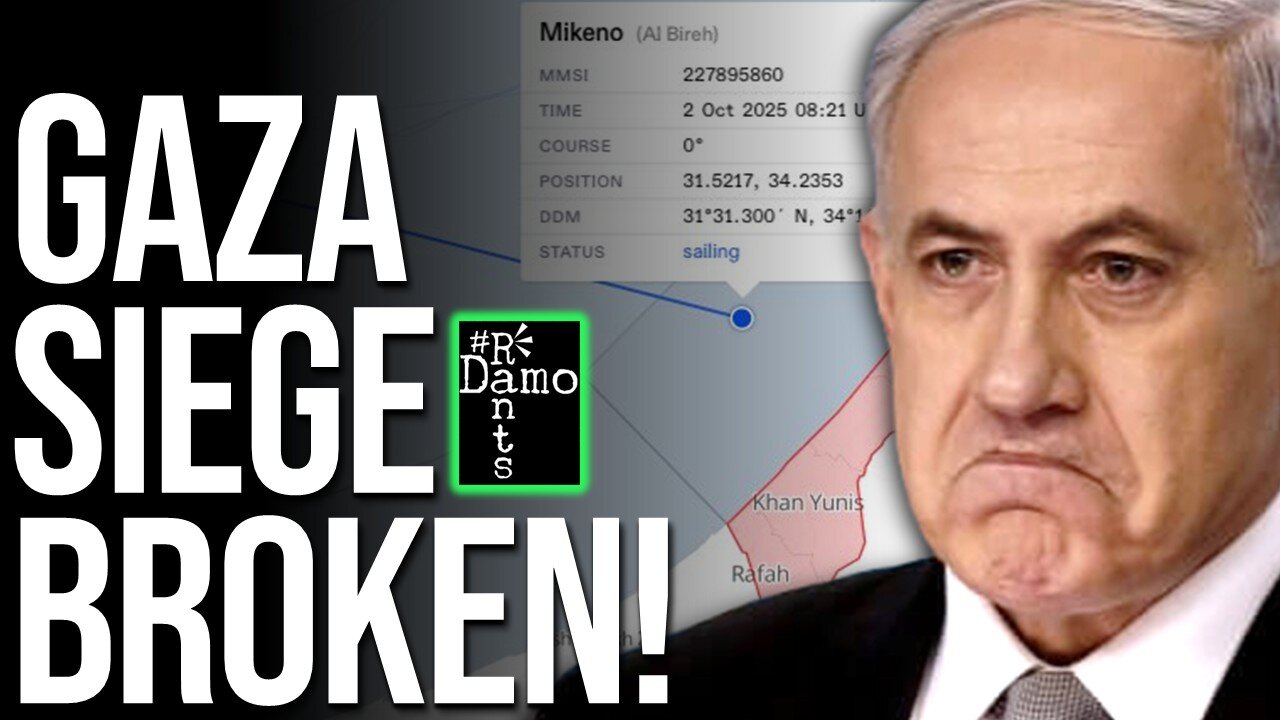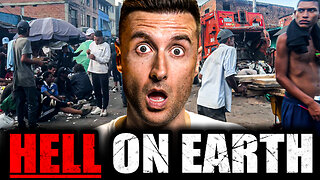Premium Only Content

Israel’s Gaza Blockade is Broken — And They've Completely Lost It
Right, so for years Israel has sold the world a story: the blockade of Gaza is airtight, the siege unbreakable, the jailer, as they are, is in total command. But overnight, the bars bent. Civilian boats — flour in their holds, activists on their decks — sailed straight for Gaza and made the whole performance look ridiculous. Naval destroyers chased bags of baby milk, drones harassed fishing boats, commandos abducting Greta Thunberg and Nelson Mandela’s grandson amongst many others, but still at least one vessel slipped through, entering Palestinian waters beyond Israel’s reach, the strength in numbers turning out to be unmanageable for Israel as we hoped it would be. It’s not clear at time of writing if that vessel made it to shore or not, but to shatter that myth of Israeli invulnerability, they didn’t have to, the optics of just making it past the Israeli line are catastrophic. You can’t call yourself invincible when a single civilian vessel has beaten you and worse, the whole world bore witness to it.
Right, so Israel has always told the world a story about Gaza. It is the story of an unbreakable siege, a blockade so complete that nothing enters or leaves without Tel Aviv’s permission. Gaza, in this narrative, is hermetically sealed: by concrete walls and checkpoints on land, by drones and aircraft in the skies, and by naval gunboats in the Mediterranean. It is a story of total control, where Israel determines who may live, who may starve, who may breathe, and who may die. For decades, this story has been performed not just as military strategy but as show business, a performance designed to convince both Palestinians and the wider world that Israel’s will is unchallengeable.
Yet overnight, that story finally collapsed.
The Global Sumud Flotilla, more than forty civilian vessels, sailed directly for Gaza. They carried humanitarian cargo: flour, medicine, powdered baby milk. But the true danger to Israel was not in the cargo but in the symbolism, in the fact ordinary people got together and said enough is enough, we’re coming for you, we’re going to break the siege. For years, Israel has justified its stranglehold on Gaza by claiming to prevent “weapons” or “terrorist infrastructure” from entering. And yet here it was, deploying destroyers, drones, and commandos against activists armed with cameras and cargo holds filled with sacks of flour. The mismatch between Israel’s rhetoric was blatant. The image of warships chasing milk powder looked less like a state defending itself than a bully terrified by the sight of baby food.
The flotilla’s organisers knew interception was inevitable. International observers noted before departure that Israel could not allow the ships to reach Gaza’s shore, because any breach would amount to humiliation. And so it played out. In the early hours, Israeli naval forces attacked in international waters, another act of piracy, more than seventy nautical miles from Gaza. Drones buzzed overhead. Flashbangs rained down onto civilian decks. Radios fell silent under electronic jamming. Commandos boarded vessels, seized them, and towed them forcibly to Ashdod. Hundreds of participants were detained.
The detainees were not faceless. Among them were the activist Greta Thunberg, Nelson Mandela’s grandson Mandla Mandela, Rima Hassan of the European parliament, Ada Colau, the former Mayor of Barcelona, Irish comedian Tadhg Hickey, Swedish actor Gustaf Skarsgård, Irish senators, Colombian activists, Malaysian aid workers. Israel thought this display of power would demonstrate invincibility. Instead, it exposed just how terrified and fragile they are and their blockade is.
Because despite the firepower, despite the seizures, not every vessel has been stopped.
For hours, rumours swirled. Some ships were still sailing east. Social media trackers showed progress markers edging closer to Gaza. Organisers reported that several boats had not been intercepted. Israel’s narrative of total control was fraying in real time.
Then came the massive confirmation. The Greek vessel Mikeno, captained by Muhammad Kuchuktigin from Turkey, had entered Palestinian waters. It had broken the siege, it had passed Israel’s line. At time of writing it has apparently stopped, likely captured, but yet to be confirmed. However it was not alone. The MV Rachel Corrie, named for the American activist crushed by an Israeli bulldozer in 2003, has also been reported to have crossed into Gaza’s maritime zone. Another vessel, the Marinette, is currently still pressing on, with three others behind it.
This was the breach.
The importance of this moment, what the Mikeno, the MV Rachel Corrie have achieved cannot be overstated. The Gaza blockade has always rested as much on perception as on practice. Israel has claimed that its grip is absolute, that defiance is futile. A blockade is only as strong as the belief that it is airtight. Once a single vessel proves otherwise, the entire illusion collapses. The myth of invincibility has now been punctured, and deterrence with it. No navy, however large, can restore that illusion once the world has seen otherwise. Civilian craft have got past Israel, whether they make land or not, this is now fact.
The symbolism of the vessels that broke through makes the damage to Israel’s image even deeper. The Greek Mikeno, forces the European Union into this story. An EU-flagged vessel reaching Gaza turns what Israel wanted framed as an internal “security” matter into an international crisis with Brussels on the hook. Its Turkish captain reawakens the memory of the Mavi Marmara massacre of 2010, when Israeli commandos stormed a Turkish vessel and killed nine activists. Fifteen years later, Ankara has already condemned this interception as terrorism. To see a Turkish mariner succeed in breaching the blockade is to reopen a wound Israel long believed it had sealed, but it bust wide open and actually I need to return to Turkey again in a moment, for another bit of breaking news.
But then there is the Rachel Corrie. Few names could wound Israel’s narrative more than that one. Rachel Corrie was twenty-three years old when she stood in front of a Palestinian home in Rafah to prevent its demolition, only to be killed by an Israeli bulldozer. Her death reverberated through global activism and remains a symbol of Western complicity in Palestinian suffering. To see her name emblazoned on the side of a vessel defying the blockade is a haunting indictment. It is as though her ghost returned to the place of her death to prove that Israel cannot silence resistance.
This is why the breach matters more than the cargo. The flotilla carried aid, but what it delivered was something even more powerful: proof that this siege can be broken. Israel can confiscate flour and medicine. It can detain activists. But it cannot undo the fact that ships entered Palestinian waters. That image, tracked from an online site, will live longer than any bag of supplies.
And this time, the legal and diplomatic consequences are profound.
Israel’s interception of the flotilla is not only politically disastrous. It is legally indefensible. The vessels were boarded in international waters, far beyond any recognised territorial jurisdiction, but just as they’ve done before. Under the United Nations Convention on the Law of the Sea, boarding another state’s vessels in such waters is prohibited except in narrow circumstances: combating piracy, halting the slave trade, or with the explicit permission of the flag state. Israel had none of these. These were not pirate ships. They were not carrying slaves. No state consented to their seizure.
Israel justifies its actions by claiming the right to enforce a blockade under conditions of armed conflict. Yet this defence collapses under scrutiny. For a blockade to be lawful under international humanitarian law, it must not starve civilians or deny them essential goods. The Gaza blockade does precisely that. Aid agencies from the World Food Programme to UNRWA have documented famine conditions. Former Israeli officials themselves admitted the blockade’s purpose was to “put Palestinians on a diet.” This is not lawful defence. It is collective punishment, expressly forbidden under the Geneva Conventions.
International law also prohibits the starvation of civilians as a method of warfare. Article 54 of Additional Protocol I to the Geneva Conventions makes it clear: starving civilians is a war crime. Yet the very items Israel prevented from reaching Gaza — flour, baby milk, medical supplies — reveal the starvation strategy very much in practice.
Furthermore, the interception of vessels registered in Greece, Ireland, Spain, and other states represents a direct affront to those nations’ sovereignty. Abducting their citizens on the high seas is not a security measure. It is kidnapping. It violates not only humanitarian law but the principle of sovereign equality between states. Every government whose citizens are now held by Israel has grounds for legal and diplomatic retaliation.
This is why the language of “piracy” and “terrorism” has become unavoidable. Hamas labelled it marine terrorism. Colombia called it piracy. Legal scholars echo those charges. To seize unarmed aid ships, abduct their passengers, and drag them into Israeli ports is an act of piracy under the plain meaning of international law.
The precedent is severe. Families of detainees will press cases in European courts. The European Parliament will be forced to respond to the abduction of one of its members - again. The ICC and ICJ, already investigating Israeli crimes in Gaza, may add this episode to their respective dockets. Israel has long depended on legal grey zones, calling its settlements “disputed,” its assassinations “targeted,” its blockade “lawful.” But the Global Sumud Flotilla has stripped away these pretences. The world has seen destroyers chasing flour and baby milk, and it has seen commandos kidnapping activists in international waters yet again. No semantic gymnastics can disguise piracy. We’re all bearing witness to it and no amount of weasel words can get Israel off the hook here.
The law is not just a matter of courts. It is a political weapon. It provides language for resistance, justification for sanctions, and legitimacy for protests and boy are there protests happening now. Every strike, every port blockade, every diplomatic expulsion can now point to law. And when law itself sides with resistance, Israeli propaganda collapses even further.
If Israel hoped to frighten the world into silence, the opposite has happened. The fallout has been global, swift, and severe.
Within hours, Bogotá expelled Israeli diplomats and terminated its free trade agreement. Colombia, is now aligning itself decisively against Israel. Latin America already had a long history of solidarity with Palestine, but rarely has it taken the form of severed agreements and diplomatic expulsions.
South Africa responded with equal clarity. The detention of Mandla Mandela strikes a deep chord in a nation that sees its own history reflected in Palestinian suffering. The government has demanded his release and condemned Israel’s actions as violations of international law. This is not merely family loyalty. It is political symbolism. The grandson of Nelson Mandela, the icon of anti-apartheid struggle, seized on the high seas by a state widely compared these days to apartheid South Africa — the resonance is devastating. It adds moral and legal weight to South Africa’s genocide case against Israel at the International Court of Justice.
Europe too has been dragged into the storm. The detention of Rima Hassan, a Member of the European Parliament, for the second time, she was also on board the Madleen, makes it impossible for Brussels to hide behind platitudes. The European Parliament itself must now debate the abduction of one of its members. Spain and Ireland, already among the strongest critics of Israel within the EU, will push harder for sanctions. Ada Colau’s detention connects the crisis directly to Spanish politics. Spain sent a warship, that just sat there like a dummy and watched the flotilla be rounded up for the most part. The EU can no longer pretend that Israel’s blockade is an external matter. Its own lawmakers are being taken hostage, international law is failing to be upheld, people put hope that they would back the flotilla to get to Gaza and deliver the aid, they face a reckoning for their inaction now.
Italy has likewise erupted in protest, having sent two warships and did nothing. Ten thousand people filled Rome’s streets in solidarity, while unions declared national strikes. Italian dockworkers, who have already refused to load arms bound for Israel, are now escalating their actions as promised, refusing to load anything bound for Israel. This is vital. Governments may equivocate, but when workers act, they apply real pressure and it has always come from people not politicians. The connection between labour struggle and Palestine solidarity is strengthening, and it terrifies Israel because it undermines not just legitimacy but logistics.
Malaysia has been equally forceful. With its own nationals detained, Kuala Lumpur condemned Israel’s “disregard for humanity” and pledged to defend its citizens. This adds to the growing Muslim-majority bloc demanding consequences.
And Turkey, haunted still by the Mavi Marmara, has sharpened its rhetoric once again. The presence of a Turkish captain on the Mikeno is one thing, but 45 Turkish vessels have apparently since launched from Arsuz we’re told in salute with the flotilla, but worth keeping an eye on. Ankara has labelled the interception of the Mikeno as terrorism, but its domestic political base will expect action. The memory of the Mavi Marmara and what happened in 2010 will not be something many Turks will have forgotten.
Even in the United States and Britain, where governments reflexively shield Israel, the optics are damaging. I’ve mentioned Greta Thunberg in detention, Mandela’s grandson in handcuffs, but former RAF veteran Malcom Ducker is amongst the British contingent aboard the flotilla, not that any RAF presence was scrambled again from Cyprus and RAF Akrotiri, once again reminding us here in the UK that our rights and our protections are secondary to Israel’s concerns to this miserable excuse for a Labour Party and a Starmer led government.
Israel wanted the world to see strength. The world saw panic. The fallout is that Israel is no longer the jailer who holds the keys to Gaza, but the state that can be defied for keeping Palestine in chains. And once defiance is visible, it spreads — from Arsuz to Bogotá, from Rome to Pretoria, from Athens to Kuala Lumpur, wherever.
Deterrence is never only material. It is psychological. It depends on belief. Israel’s deterrence depended on the belief that the blockade was unbreakable. It’s been broken. That belief is gone.
The Mikeno brought the walls tumbling down. The Rachel Corrie widened it. The Marinette may bust it wider still yet. The solidarity boats from Arsuz proved the idea contagious. The protests in Rome showed mass mobilisation. Colombia’s expulsions demonstrate governments can act and that doing so or not doing so is always a choice. Each chip weakens the blockade’s aura of inevitability.
The comparison with 2010’s Mavi Marmara is instructive. That massacre showed Israel’s brutality but reinforced deterrence. Activists arguably hesitated for years. This time, the outcome is different. The Global Sumud Flotilla has shown Israel’s limits. And once limits are visible, deterrence collapses. A bigger flotilla, 100, 200 is surely now something we know Israel couldn’t handle?
History may look back on October of 2025 as the day Israel’s blockade of Gaza began to collapse. Not because aid flowed freely, but because the myth of total control was shattered. The siege is no longer absolute. It has been exposed as vulnerable, fallible, beatable.
Israel can still arrest activists, seize ships, and bombard Gaza. But it cannot restore the illusion of invincibility. The world has seen otherwise. The world has seen a ship reach Palestinian waters. The world has seen a vessel named Rachel Corrie sail in defiance. The world has seen Greta Thunberg, Mandla Mandela, Rima Hassan and many others abducted, and it has responded with fury.
The question is no longer whether the blockade can be breached. It has been. The question is how many more times it will be breached from here on, how quickly governments will act, how far solidarity will spread. Will there be a permanent humanitarian sea corridor? Will unions blockade ports until the siege collapses entirely? Will more states follow Colombia in breaking ties? These are issues that will be covered in the days to come
The siege is broken. And once broken, it will break again and again. Ordinary people did it. Ordinary people willed it to happen. Ordinary people have more power than Israel does. And every government around the world now knows it too.
If you don’t think 100 vessels is enough though, how about 1000? I spoke the other day about such a venture, so check out all the details about that story in this video recommendation here as your suggested next watch.
Please do also hit like, share and subscribe if you haven’t done so already so as to ensure you don’t miss out on all new daily content as well as spreading the word and helping to support the channel at the same time which is very much appreciated, holding power to account for ordinary working class people and I will hopefully catch you on the next vid. Cheers folks.
-
 19:54
19:54
Forrest Galante
7 hours agoPrivate Tour Of America's Best Marine Animal Facility
8.31K6 -
 9:25
9:25
MattMorseTV
1 day ago $8.44 earnedSupreme Court just DROPPED a NUKE.
12.1K50 -
 13:25
13:25
Nikko Ortiz
1 day agoWorst Karen TikTok Fails
9.44K10 -
 40:24
40:24
The Connect: With Johnny Mitchell
2 days ago $18.41 earnedInside The WORST Drug-Infested Slums Of Medellin, Colombia
56.6K29 -
 4:14
4:14
GritsGG
14 hours ago2 Warzone Easter Eggs! How to Find Them EASILY!
4.8K -
 LIVE
LIVE
Lofi Girl
2 years agoSynthwave Radio 🌌 - beats to chill/game to
239 watching -
 1:45:43
1:45:43
Man in America
14 hours agoThe DISTURBING Truth About Parasites — Live Q&A w/ Dr. Jason Dean
71.1K38 -
 7:13:47
7:13:47
SpartakusLIVE
10 hours ago#1 Mountain of Muscle with HUGE Legs saves your weekend from complete BOREDOMNight HYPE
42.3K1 -
 47:42
47:42
Sarah Westall
11 hours agoFreedom or Slavery? AI will Change Everything w/ Trump Senior Advisor Marc Beckman
56.7K12 -
 2:23:20
2:23:20
vivafrei
17 hours agoEp. 285: Visa Revocation No-Go! Sortor Arrested! Ostrich Crisis! 2A Win! Comey Defense & MORE!
115K109
